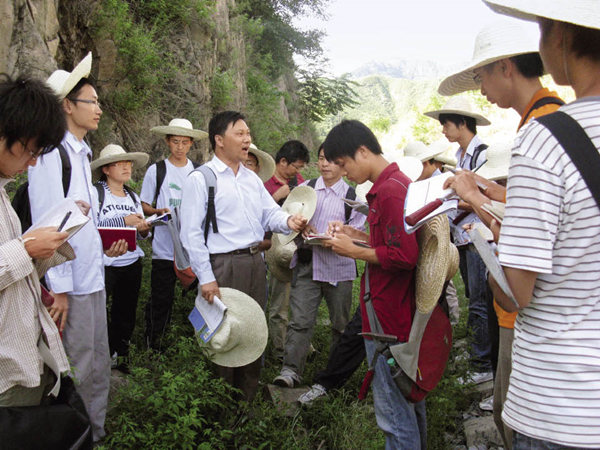Lai Shaocong: Explorer of the Beauty of Geology
China Today by DUAN HAIWANG, December 23, 2016 Adjust font size:
Pupils Everywhere
In the eyes of his students, Lai is a conscientious and reliable tutor. Each of his classes perfectly combines academic rigor and passion, knowledge and wisdom, and true originality.
Lai’s approach to cultivating talents is to motivate students’ capacity for learning, innovation, and a brand-new geological outlook. “Scientific research is mainly a matter for my own interest, and teaching students is to stimulate their interest in petrology,” Lai said. He believes that students should accomplish a transition from the “ask me to study” to “I am willing to study” to “I know how to study” mindset.

Lai Shaocong leads his students in a field survey.
To promote their research and innovation capabilities, he included in his course reforms to research-teaching methods. Understanding theory and verifying descriptions of rock forms traditionally depended solely on observation. Lai’s class stresses key points while simplifying tedious memorization, and also provides students with typical problems and references through which to write assignments to show they understand the topic. When teaching field practice, he provides fundamental materials and gets students to analyze samples through various methods and make rock identifications and analyses. “They need to comprehensively apply knowledge they have learned. These are effective ways of strengthening their operational ability, integrative competence and thinking,” Lai said.
Lai’s teaching reforms have significantly closed the gap between China’s traditional system of geology education and that in developed countries. “Both our curriculum and teaching methods are behind, as they overlook methodology and capacity cultivation and focus solely on knowledge infusion, plus the single evaluation mode,” Lai said when explaining why Chinese geology talents do not excel in international competitiveness.
This is the main reason for his proactive participation in education reform and research.
In view of the weakness of the current mineral and rock curriculum system, Lai has optimized core curriculum group knowledge and established a distinct and new course system featuring four levels of theory, frontier science, and exploration. He has also initiated a new informationized type of practical teaching that encompasses basic training, ability enhancement, as well as exploration and innovation. He has moreover established a number of digital information-based teaching platforms, such as crystal 3D visual teaching, a global typical mineral and rock information base, the teaching of virtual polarized microscope use and that of international leading digital experimental microscopes.
This work has substantially enhanced talent cultivation, making geology a top major at Northwest University and rated as a national excellent science talent training base by the National Natural Science Foundation of China.